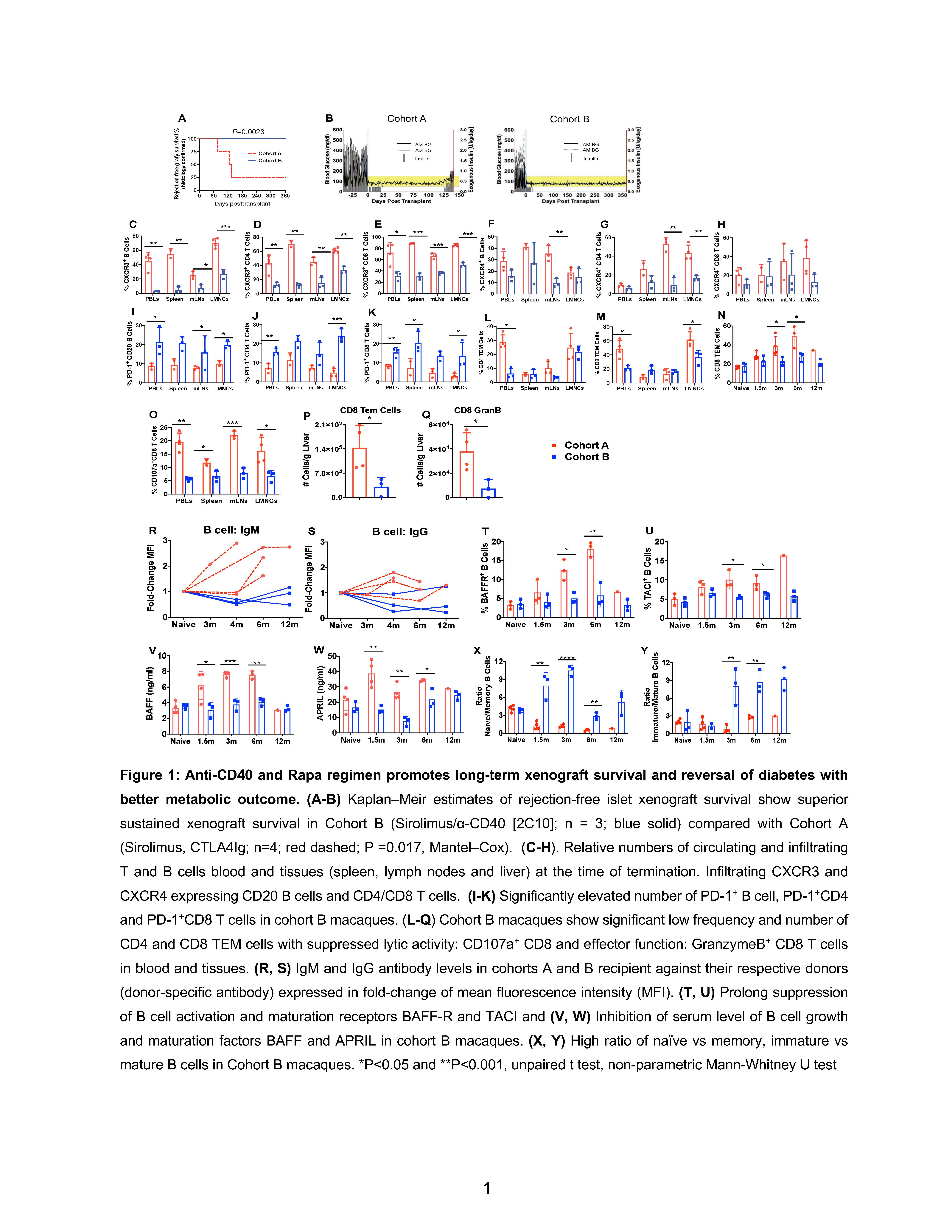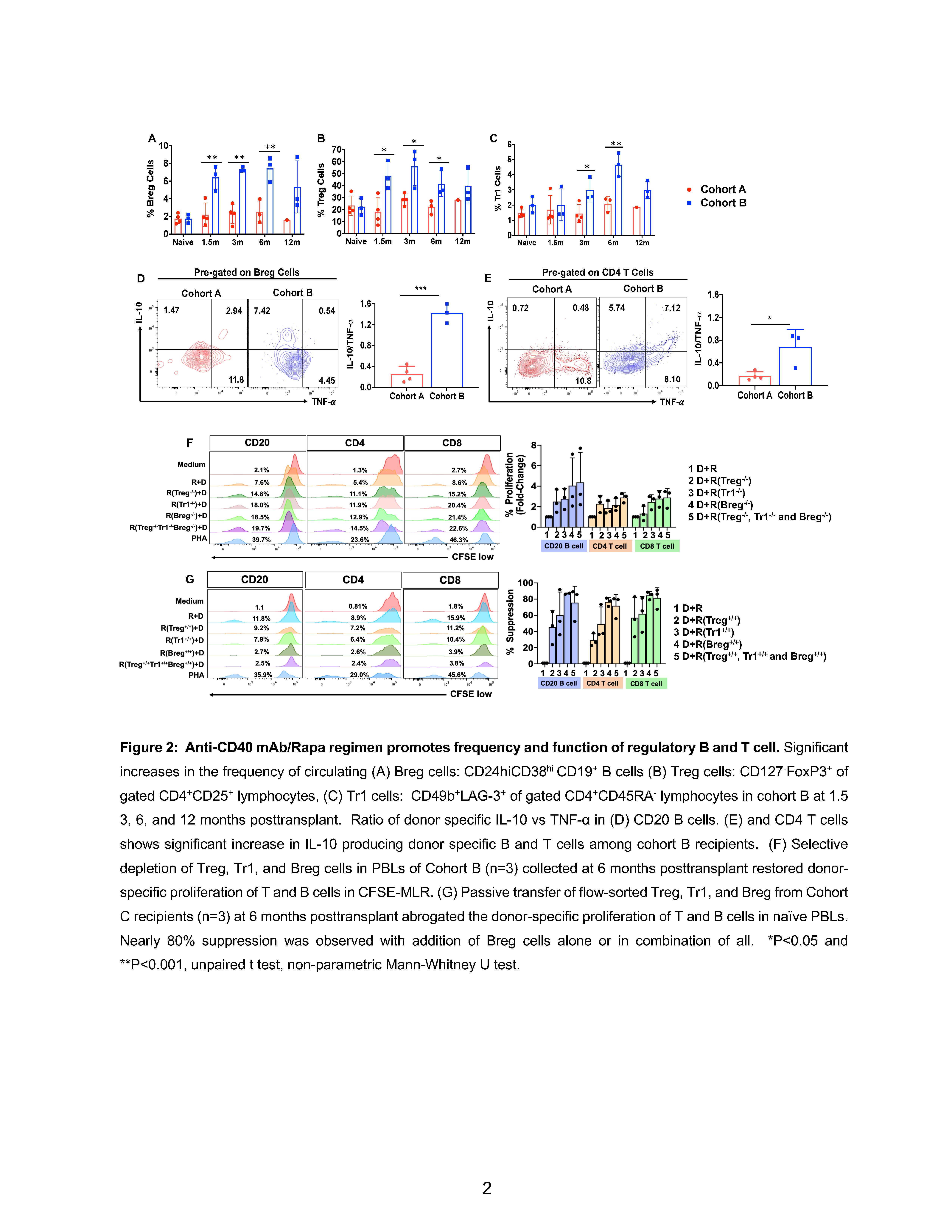CD40-specific costimulation blockade and rapamycin prevent porcine islet-xenograft rejection in nonhuman primates through regulation of B and T cell xenoreactivity
AMAR SINGH1, Sabrinathan Ramachandran1, Melanie L. Graham1, Appakalai N. Balamurugan1, Bernhard J. Hering1.
1Surgey, University of Minnesota, MINNEAPOLIS, MN, United States
Introduction: Pig-to-human islet xenotransplantation is one attractive approach with potential to alleviate the shortage of islet donors for beta cell replacement in diabetes. For islet xenotransplantation to play a vital role in diabetes care, safe and effective strategies for prevention of islet xenograft rejection must be developed. Blocking CD40L:CD40 costimulation with anti-CD40L antibodies has allowed several investigators to achieve long-term porcine islet xenotransplant survival in nonhuman primates. Antagonistic anti-CD40 antibodies are in clinical development in autoimmunity and transplantation to block CD40L:CD40 costimulation without thromboembolic risks. Herein, we investigate the efficacy and mechanisms of action of maintenance immunosuppression with anti-CD40 Ab 2C10.R4 or CTLA4-Ig in combination with rapamycin in pig-to-nonhuman primate (NHP) islet xenotransplant.
Methods: Cultured pig islets (25,000 IE/kg) were transplanted intraportally into diabetic cynomolgus macaques. Induction immunosuppression included basiliximab and CTLA4-Ig and then maintenance with rapamycin and either CTLA4Ig (cohort A, n=4) or 2C10R4 (cohort B, n=3). B and T cell phenotypes and functional profiles were assessed by flowcytometry using cryopreserved blood and spleen, lymph node, and liver samples. The development of donor-specific antibodies (DSAs), levels of BAFF, APRIL, and cytokines were monitored in serum.
Results: Islet xenograft survival was ≥306 days in 1 of 4 recipients in cohort A (Fig.1). Conversely, the cohort B regimen facilitated long-term (>1 yr) functional islet xenograft survival in 3 of 3 recipients. The examination of infiltrating cells in tissues revealed few CXCR3+ and CXCR4+ B cells and a high abundance of PD-1+ exhaust-like B and T cell subsets in cohort B recipients. We noted, a significantly higher presence of CD8 TEM cells in blood and tissue that express cytokine and cytolytic effectors in cohort A (Fig.1). Prolonged suppression of DSAs, B cells expressing BAFFR and TACI, lower serum levels of BAFF/APRIL, and preponderance of naïve and immature B cells post-tx were noted only in cohort B (Fig.1). Furthermore, only cohort B showed expansion of Breg and Treg cells post-tx, both subsets displaying higher IL-10/TNF-A (alpha) ratios in Cohort B vs A (Fig.2).
Conclusion: Maintenance with anti-CD40 plus rapamycin was associated with suppression of early B cell sensitization, posttransplant expansion of TEM cells, and B/ T cell activation and proliferation. Blocking CD40 signaling regulated cellular immunity by increasing the frequency of functional regulatory B and T cells. The long-term functional and histologic survival of islet xenografts indicates the robust effectiveness of the anti-CD40 plus rapamycin maintenance regimen in the stringent pig-to-NHP xenoislet transplant model.


We gratefully acknowledge the excellent and expert care, husbandry, and training of our animals by the team at the University of Minnesota’s Preclinical Research Center, coordinated by Lucas Mutch. We thank Jean Witson, Thomas Gilmore, Jeffrey Ansite, Steven Kass, and Emily Hennessy of the Schulze Diabetes Institute at the University of Minnesota. We gratefully acknowledge the supported by the National Institute of Allergy and Infectious Diseases of the National Institutes of Health and the Juvenile Diabetes Research Foundation .